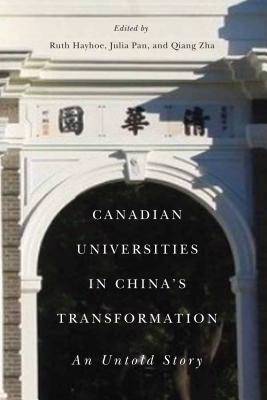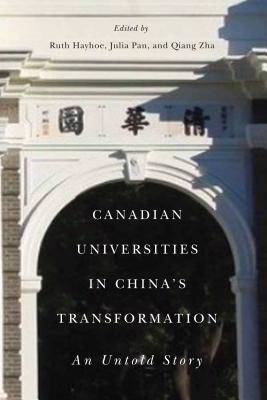
- Afhalen na 1 uur in een winkel met voorraad
- Gratis thuislevering in België vanaf € 30
- Ruim aanbod met 7 miljoen producten
- Afhalen na 1 uur in een winkel met voorraad
- Gratis thuislevering in België vanaf € 30
- Ruim aanbod met 7 miljoen producten
Zoeken
Canadian Universities in China's Transformation
An Untold Story
Ruth Hayhoe, Julia Pan, Qiang Zha
Paperback | Engels
€ 60,45
+ 120 punten
Uitvoering
Omschrijving
Canada was one of the first Western countries to sign an agreement to provide development aid to China in 1983, and the Canadian International Development Agency invited universities to cooperate in ways that would facilitate the multiplication of contacts at the thinking level. In Canadian Universities in China's Transformation, leading scholars from Canadian and Chinese universities elaborate on the historical experience of collaboration in areas as different as environmental science, marine science, engineering, management, law, agriculture, medicine, education, minority cultures, and women's studies. Contributors use theoretical frames such as dependency theory, human capital, the knowledge economy, and Habermas's theory of communicative action, to facilitate a striking dialogue between Canadian and Chinese perspectives on common questions. They provide insights into factors that ensured the long-term success of some partnerships, as well as barriers that hindered others, and vivid lessons for current collaboration. Case studies include a project that began with the training of Chinese judges developing into reciprocal programs in legal education in China, Canada, and Latin America, and an examination of how joint environmental research has had policy impacts at national and international levels. Presenting the story of universities working together in the era after the Cultural Revolution, Canadian Universities in China's Transformation is a unique account of partnerships in knowledge production and application and their resulting impacts.
Specificaties
Betrokkenen
- Auteur(s):
- Uitgeverij:
Inhoud
- Aantal bladzijden:
- 384
- Taal:
- Engels
Eigenschappen
- Productcode (EAN):
- 9780773547308
- Verschijningsdatum:
- 11/07/2016
- Uitvoering:
- Paperback
- Formaat:
- Trade paperback (VS)
- Afmetingen:
- 152 mm x 229 mm
- Gewicht:
- 566 g

Alleen bij Standaard Boekhandel
+ 120 punten op je klantenkaart van Standaard Boekhandel
Beoordelingen
We publiceren alleen reviews die voldoen aan de voorwaarden voor reviews. Bekijk onze voorwaarden voor reviews.







